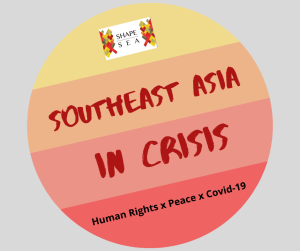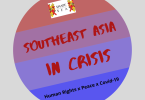UN Women Regional Office for Asia and the Pacific
 The COVID-19 pandemic has given rise to a new landscape for violent extremist organisations (VEO) to exploit those vulnerable to recruitment in Southeast Asia. Lockdowns in the region have disrupted livelihoods, increasing socio-economic pressures and shifting the drivers and dynamics of extremist recruitment. In this setting, women have been exposed to new and evolving threats of recruitment.That VEO employ gendered recruitment strategies is not a new phenomenon. From seeking ‘Jihadi brides’ to calling for women to play a submissive role in supporting male family members participation with VEOs, taking advantage of gendered vulnerabilities and stereotypes has long been a tactic.But in the context of COVID-19, with many women and girls confined to their homes due to lockdowns, community resilience against recruitment by VEO may be weakened, having a particularly harmful effect on women and girls.Violent extremist messaging during COVID-19 restrictions may expose women to greater risks of misogynistic violence, actively court their participation as violent actors, and limit their capacity to act as preventers of violent extremism.The nexus between misogyny, domestic violence and violent extremismDuring COVID-19 lockdowns in Southeast Asia, there has been a spike in misogynistic posts on social media. A comparative historical analysis revealed that the number of misogynistic posts on Facebook during COVID-19 lockdowns in March through June 2020 was 168% higher than the number of misogynistic posts posted in the same groups during the corresponding time period in 2019 (UN Women, 2020). While it is unclear if these misogynistic posts were being placed by VEO, it is known that hostile sexist attitudes toward women and support for violence against women are the factors most strongly associated with support for violent extremism (Johnson, et al, 2020). In this way, the surge in online misogyny during the lockdowns may be fuelling support for violent extremism in the region. This is likely to have far reaching consequences as the promotion of gender equality within the family and community is one of the most powerful ways to counteract violent extremist ideologies (UN Women, 2020).Further, reported cases of domestic violence have increased significantly since the start of the pandemic. In the first 100 days of the pandemic, hotlines in Malaysia reported a 57 per cent increase in calls on domestic violence (UN Women, 2020). An emerging element of the dynamic of domestic violence and links to violent extremism during this period is reports that VEO are responding to increases in domestic violence by presenting themselves as a safer option for women trapped in abusive home environments. They are seeking to boost recruitment by offering women alternatives to an unsafe home environment with protection within their networks (Monash University, 2020).Poverty and despair increase the risks of women as perpetrators In Mindanao, Philippines, Islamic militants are recruiting vulnerable groups living in fragile situations who have been deeply impacted by the pandemic, including by losing their livelihoods (Banlaoi, 2020). The informal labour sector, where women are overrepresented, has been hard hit by the pandemic, making women seek alternative economic opportunities, and more vulnerable to recruitment by VEO and the financial security on offer. Since the outbreak of the virus, ISIS-affiliated groups have carried out at least two attacks in Mindanao, and reports suggest that the two suicide bombers were women (Gutierrez, 2020).Across Southeast Asia, there is growing evidence that during this period women are taking on more active roles in extremist networks (Yousaf, 2020, and Jamal, 2020). In Indonesia for example, there is a trend of increasing involvement of women in terrorist activities (Nasir, 2020).Essential times to support women preventing violent extremismGiven how VEO are responding to the new landscape of COVID-19, it is now more important than ever to support women’s rights and agency, including their opportunities to prevent violent extremism.For many years, women have been at the forefront of preventing violent extremism in Southeast Asia – in many situations, women have been the first to feel, see and hear early warning signs of community violence and radicalization. However, COVID-19 mobility restrictions have created difficulties for women to access communities at risk and to participate in day-to-day measures to maintain social cohesion in their own communities.Enhancing gender equality and supporting women to build community resilience are two of the most pressing needs to reduce the risks of extremist movements taking advantage of crisis situations, like COVID-19.
The COVID-19 pandemic has given rise to a new landscape for violent extremist organisations (VEO) to exploit those vulnerable to recruitment in Southeast Asia. Lockdowns in the region have disrupted livelihoods, increasing socio-economic pressures and shifting the drivers and dynamics of extremist recruitment. In this setting, women have been exposed to new and evolving threats of recruitment.That VEO employ gendered recruitment strategies is not a new phenomenon. From seeking ‘Jihadi brides’ to calling for women to play a submissive role in supporting male family members participation with VEOs, taking advantage of gendered vulnerabilities and stereotypes has long been a tactic.But in the context of COVID-19, with many women and girls confined to their homes due to lockdowns, community resilience against recruitment by VEO may be weakened, having a particularly harmful effect on women and girls.Violent extremist messaging during COVID-19 restrictions may expose women to greater risks of misogynistic violence, actively court their participation as violent actors, and limit their capacity to act as preventers of violent extremism.The nexus between misogyny, domestic violence and violent extremismDuring COVID-19 lockdowns in Southeast Asia, there has been a spike in misogynistic posts on social media. A comparative historical analysis revealed that the number of misogynistic posts on Facebook during COVID-19 lockdowns in March through June 2020 was 168% higher than the number of misogynistic posts posted in the same groups during the corresponding time period in 2019 (UN Women, 2020). While it is unclear if these misogynistic posts were being placed by VEO, it is known that hostile sexist attitudes toward women and support for violence against women are the factors most strongly associated with support for violent extremism (Johnson, et al, 2020). In this way, the surge in online misogyny during the lockdowns may be fuelling support for violent extremism in the region. This is likely to have far reaching consequences as the promotion of gender equality within the family and community is one of the most powerful ways to counteract violent extremist ideologies (UN Women, 2020).Further, reported cases of domestic violence have increased significantly since the start of the pandemic. In the first 100 days of the pandemic, hotlines in Malaysia reported a 57 per cent increase in calls on domestic violence (UN Women, 2020). An emerging element of the dynamic of domestic violence and links to violent extremism during this period is reports that VEO are responding to increases in domestic violence by presenting themselves as a safer option for women trapped in abusive home environments. They are seeking to boost recruitment by offering women alternatives to an unsafe home environment with protection within their networks (Monash University, 2020).Poverty and despair increase the risks of women as perpetrators In Mindanao, Philippines, Islamic militants are recruiting vulnerable groups living in fragile situations who have been deeply impacted by the pandemic, including by losing their livelihoods (Banlaoi, 2020). The informal labour sector, where women are overrepresented, has been hard hit by the pandemic, making women seek alternative economic opportunities, and more vulnerable to recruitment by VEO and the financial security on offer. Since the outbreak of the virus, ISIS-affiliated groups have carried out at least two attacks in Mindanao, and reports suggest that the two suicide bombers were women (Gutierrez, 2020).Across Southeast Asia, there is growing evidence that during this period women are taking on more active roles in extremist networks (Yousaf, 2020, and Jamal, 2020). In Indonesia for example, there is a trend of increasing involvement of women in terrorist activities (Nasir, 2020).Essential times to support women preventing violent extremismGiven how VEO are responding to the new landscape of COVID-19, it is now more important than ever to support women’s rights and agency, including their opportunities to prevent violent extremism.For many years, women have been at the forefront of preventing violent extremism in Southeast Asia – in many situations, women have been the first to feel, see and hear early warning signs of community violence and radicalization. However, COVID-19 mobility restrictions have created difficulties for women to access communities at risk and to participate in day-to-day measures to maintain social cohesion in their own communities.Enhancing gender equality and supporting women to build community resilience are two of the most pressing needs to reduce the risks of extremist movements taking advantage of crisis situations, like COVID-19.
References:
UN Women. 2020. Forthcoming publication by UN Women Regional Office for Asia and the Pacific on online misogyny and hate speech directed at women during the COVID-19 pandemic. (https://asiapacific.unwomen.org/en/digital-library/publications).Johnston, Melissa, Jacqui True, Eleanor Gordon, Yasmin Chilmeran, and Yolanda Riveros-Morales. 2020. “Building a Stronger Evidence Base: The Impact of Gender Identities, Norms and Relations on Violent Extremism (a case study of Bangladesh, Indonesia and the Philippines).â€Â UN Women Regional Office for Asia and the Pacific. Retrieved October 14, 2020 (https://asiapacific.unwomen.org/en/digital-library/publications/2020/05/building-a-stronger-evidence-base-the-impact-of-gender-identities-norms).UN Women. 2020. “Preventing Violent Extremismâ€. UN Women Regional Office for Asia and the Pacific. Retrieved October 14, 2020 (https://asiapacific.unwomen.org/en/focus-areas/peace-and-security/preventing-violent-extremism).UN Women. 2020. “The First 100 Days of COVID-19 in Asia and the Pacific: A Gender Lensâ€. UN Women Regional Office for Asia and the Pacific. Retrieved October 14, 2020 (https://asiapacific.unwomen.org/en/digital-library/publications/2020/04/the-first-100-days-of-the-covid-19-outbreak-in-asia-and-the-pacific).Monash University. June 8, 2020. “COVID-19 and Violent Extremism: Gender Perspectives –  Webinarâ€. Monash University, Gender, Peace and Security. Retrieved October 14, 2020 (https://www.monash.edu/arts/gender-peace-security/news-and-events/articles/webinar-recording-covid-19-and-violent-extremism-gender-perspectives).Banlaoi, Rommel. May 15, 2020. “Terrorism in The Philippines During the Pandemic: Persistent Threats Three Years After Marawi Siege – Analysisâ€. Eurasia Review. Retrieved October 14, 2020 (https://www.eurasiareview.com/15052020-terrorism-in-the-philippines-during-the-pandemic-persistent-threats-three-years-after-marawi-siege-analysis/).Gutierrez, Jason. August 24, 2020. “At Least 14 Killed After Suicide Bombers Hit Philippinesâ€. New York Times. Retrieved October 14, 2020 (https://www.nytimes.com/2020/08/24/world/asia/-philippines-explosions-jolo-sulu.html).Yousaf, Farooq. September 23, 2020. “Covid-19 and the Threat from Islamic State’s Online and ‘Family’ Networksâ€. Australian Strategic Policy Institute. Retrieved October 14, 2020 (https://www.aspistrategist.org.au/covid-19-and-the-threat-from-islamic-states-online-and-family-networks/).Jamal, Umair. August 25, 2020. “How are Women Transforming Indonesia’s Extremist Landscape?â€. ASEAN Today. Retrieved October 14, 2020 (https://www.aseantoday.com/2020/08/how-are-women-transforming-indonesias-extremist-landscape/).Nasir, Amalina Abdul. May 28, 2020. “How Indonesia Can Address the Growing Number of Female Extremists: Indonesia’s gender-based counterterrorism approach faces several challengesâ€. The Diplomat. Retrieved October 14, 2020 (https://thediplomat.com/2020/05/how-indonesia-can-address-the-growing-number-of-female-extremists/).





